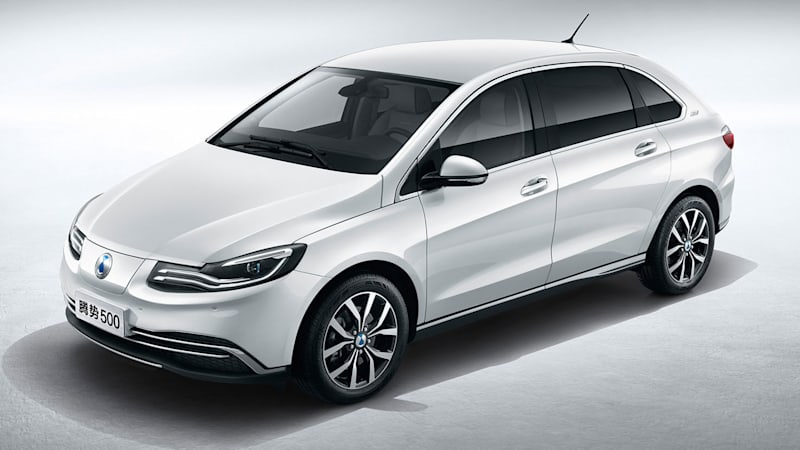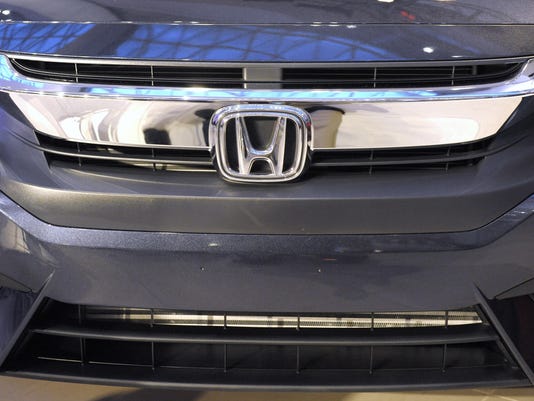Honda Motor Co.'s alliance with General Motors Co.'s self-driving unit creates a formidable trans-Pacific player to develop and build an autonomous vehicle, powered by a $2.75 billion investment from the Japanese automaker.
The tie-up announced Wednesday leapfrogs the smaller Honda from the back of the pack in the race to deploy autonomous vehicles to the market. And it signals a vote of confidence in the self-driving technology developed by GM Cruise LLC, the Detroit automaker's autonomous-vehicle unit.
"For Honda to contribute that amount of money really elevates GM's efforts," said Mike Ramsey, an automotive analyst for research firm Gartner Inc. "This also gives you a sense of how hard it is to develop this technology and these vehicles on your own. GM clearly was willing to do this, and wouldn't do it if they didn't see a true benefit in sharing the cost with another major automaker."
In addition to its expertise in automotive interiors and engineering, Honda is bringing a significant financial investment to the table. It first will make a $750 million equity investment in GM Cruise to take a 5.7 percent stake in the GM division, which has helped the Detroit automaker become a leader in self-driving systems development.
The Japanese automaker also will contribute about $2 billion over 12 years to fund and develop a "purpose-built" autonomous vehicle for Cruise that can serve a variety of uses for global deployment.
Honda had been in talks with Waymo, the self-driving project of Google parent Alphabet Inc., since 2016. As recently as April,
Waymo stated that a deal to work with Honda on a delivery-based service was "coming soon."
But Honda executive vice president Seiji Kuraishi told reporters Wednesday that its partnership with GM Cruise was "exclusive."
"We are going forward by leveraging each other's strengths, and would like to expand (in) this business field," he said through an interpreter.
The three-way partnership between Honda, GM and its self-driving unit is designed to equip GM Cruise with "the world's best design, engineering and technology resources to further establish them as a leader in AV technology with global reach and the ability to deploy at scale," CEO Mary Barra said at the company's technical and engineering hub in Warren.
GM and Honda have been
working together on fuel-cell technology since 2013, a partnership that was strengthened last year when GM and Honda equally split $85 million in investment to create Fuel Cell System Manufacturing LLC - the auto industry's first joint-venture for fuel-cell manufacturing - at GM's battery-pack assembly plant in Brownstown Township.
The two automakers
expanded their partnership on zero-emissions vehicles earlier this year with an agreement to jointly develop battery cells and modules. In the deal announced Wednesday, the companies will work together to build an autonomous vehicle to be manufactured by GM, not Honda.
Most of the funding provided by Honda will go toward development of that vehicle, with some contribution to develop new market opportunities at Cruise. The partnership will allow GM and Honda to deploy autonomous vehicles across the world, leveraging the geographic footprints of both automakers, GM President Dan Ammann said.
The project with Honda is separate from GM's
launch of a driverless ride-service next year, and is focused on building what Ammann called "the next evolution in the future of transportation."
GM already is building test versions of its driverless Cruise AV, based on the Chevrolet Bolt EV, at its
Orion Assembly Plant. The roof modules for the vehicles are built at GM's Brownstown Battery Assembly Plant. GM plans to build its production version of the Cruise AV, without a steering wheel or control pedals, at the two plants next year.
"One of the things that is underappreciated in this industry is going from a prototype vehicle that is covered in sensors and computers to one that can be produced on an assembly line," Cruise CEO Kyle Vogt told The Detroit News. "It is no easy task, especially if you want to do that in volume."
But with Honda at the table, that process is expected to move a little faster: "We will be able to take all the things we've learned from (working with GM) and apply them to the vehicle we're building together with Honda," Vogt said. "It shortens the timeline to go from the initial vehicle to a really great one like the one we're envisioning."
The two automakers are aiming to build a driverless car from the ground up, designed from the start to ferry people and things without the need for a driver. GM engineers will work on the base architecture of the autonomous vehicle, with Honda engineers and the Cruise team joining in for its overall development, including testing to ensure safety.
That vehicle might include a tricked-out interior with a TV, mini bar and lay-flat seats, as Vogt wrote in a Wednesday blog post, but it will also likely be engineered to practically operate in Cruise's network.
Vogt told The News that Honda's "talents in building space-efficient vehicles" fit well into GM's ultimate goal of a world without congestion, fossil-fuel emissions or crashes. The two automakers also have complementary global footprints, with Honda offering GM a gateway into the Japanese market.
"If you think about … the geographic reach of Honda and how it overlaps - or doesn't overlap - with the geographic reach of General Motors, that will perhaps give you a perspective on some of the things we might be thinking about," Ammann told investors on a conference call.
Honda's total $2.75 billion investment comes after Japanese investment-firm SoftBank Investment Advisers invested $2.25 billion in Cruise earlier this year, bringing the valuation of GM's autonomous vehicle unit to $14.6 billion.
GM plans to launch its driverless fleet of its Bolt-based Cruise AVs in a yet-to-be-named city in 2019. The Detroit automaker submitted earlier this year its federal safety proposal to put a driverless vehicle with no steering wheel, gas pedal or brake pedal on public roads. GM's efforts to deploy autonomous vehicles accelerated after its acquisition of Cruise Automation in 2016, earning the Detroit automaker credibility with industry observers and investors.
Ammann said GM's 2019 driverless-fleet launch is still "the target," but did not offer updates on the timetable.
"We are moving as fast as we can to deploy this technology," he said. "Adding the resources is only going to move us further and faster."
by: www.detroitnews.com



